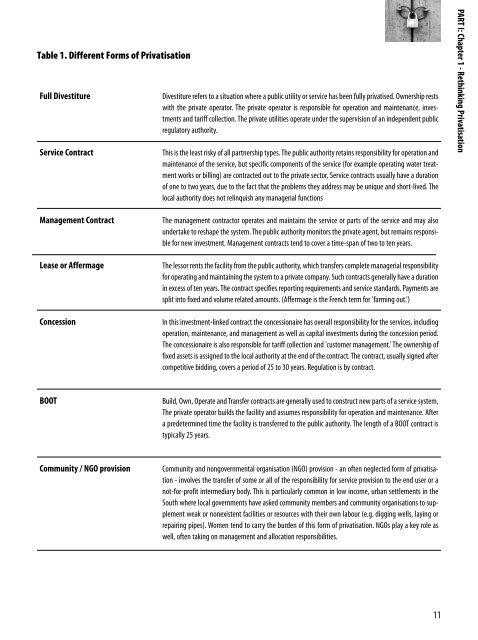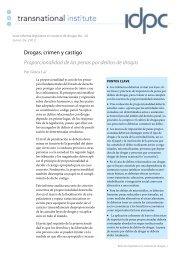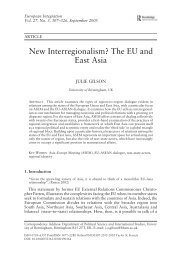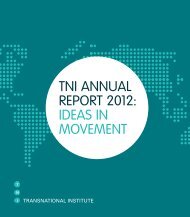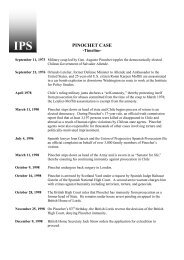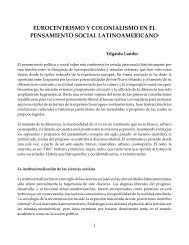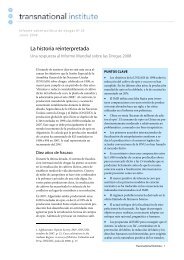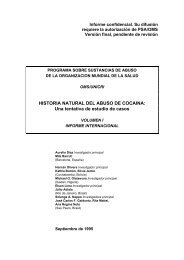oversight in this model of privatisation remain a responsibilityof the state, however, or a parastatal regulatorybody.The privatisation of services in other parts of theworld does not necessarily follow the UK model though.Most municipal privatisation schemes today do notinvolve any transfer of state assets, focusing instead onthe transfer of operational and managerial functions toprivate companies (e.g. meter reading, personnel management,strategic planning, maintenance).Infrastructure and equipment typically remain in publichands – or are transferred back to public ownership aftera specified period – and there may be joint responsibilitiesbetween the state and a private firm in managingoperational functions. This model is used across theworld by leading water firms such as Suez and Veolia(formerly known as Vivendi Environnement), whichoperate this way in over 12.000 towns and cities(Goubert, 1986; Hanke, 1987; Lorrain, 1991; Kerf, 1998).More properly known as ‘private sector participation’(PSP) or, as will be used in this chapter, ‘public-privatepartnerships’ (PPPs), these institutional arrangementsare nevertheless a form of privatisation. There is a cleartransfer of crucial decision making responsibilities fromthe public to the private sector and an effective transfer ofpower over assets to a private company, with qualitativelyand quantitatively different rules and regulations guidingthe decisions that are made and how citizens are ableto access information. This broader definition of privatisationis also accepted by leading international agenciessuch as the World Bank, the World Health Organisation,the Water Supply and Sanitation Collaborative Counciland various United Nations–related agencies who haveactively promoted PPPs in public services in the South,such as the United Nations Development Programme,UN-HABITAT and UNICEF (see, for example, Lorrainand Stoker, 1997; Kerf, 1998; World Bank, 1994, 1997,2003; WHO and UNICEF, 2000; UNDP-World Bank,1998).It is also important to note that PPPs can range fromsmall operations, such as one-person contractors whorepair pipes in an informal urban settlement, to a largemultinational company hired to manage the provision ofbulk water and sanitation for an entire city. The size andtypes of contracts can vary as well, from short-term, feefor-servicecontracts, to 30-year licenses. Although largewater service multinationals like Suez, Veolia, RWEThames, and (until recently) Bechtel tend to attract themost attention when it comes to water privatisationdebates, small firms and ‘entrepreneurs’ represent a largepart of the privatisation thrust, with these micro-enterprisedeals often going unnoticed by the public. Thissmaller, ‘creeping’ form of privatisation is as much a topicof interest as the large multinational efforts to take overentire water systems.Less easy to classify are forms of privatisation thatinvolve the downloading of service responsibilities toindividuals, communities and nongovernmental organisations.Represented in the neo-liberal literature as ‘activecitizenship’ (Burrows and Loader, 1994) and ‘communityempowerment’ – a counter to welfare dependency(Wolch and Dear, 1989) – this transfer of decision makingand responsibility also constitutes a move from thepublic (i.e. the state) to the private (in this case an individualor community). Although not necessarily actingwith the same institutional or economic incentives andframeworks as a private company, the transfer of decisionmaking power to individuals and communities neverthelessconstitutes an abdication of responsibilities on thepart of the state.Table 1 provides a typology of privatisation arrangements.Most agreements are hybrids of these categories,of course, tailored to suit the specific situation of individualgovernments and companies, but it should be clearfrom the table that all privatisation schemes involve someform of public and private sector participation.Privatisation, in other words, is not an either/or situation(either the state owns and runs a service or the private/communitysector does). Privatisation must be seenas a continuum of public and private mixes, with varyingdegrees of involvement and exposure to risks by the twosectors (see Starr, 1988). It is a conceptual and politicalmistake to pose the market (private) and the state (public)as binary opposites on this issue.Moreover, as Bakker (2003:4-36) has argued in thecase of the UK, even the outright divestiture of stateassets can, ironically, mean greater state involvement inservices, prompting her to employ the term ‘re-regulation’rather than ‘deregulation’ in regards to legislativechanges that allow for greater private sector involvementin public services: “a process in which the state has reconfiguredits role, and in some instances expanded its powersand administrative reach (…) the state does not necessarilywithdraw, but rather changes the nature of its interactionwith citizens and corporations.”The term privatisation is therefore used here as a10
Table 1. Different Forms of PrivatisationFull DivestitureService ContractDivestiture refers to a situation where a public utility or service has been fully privatised. Ownership restswith the private operator. The private operator is responsible for operation and maintenance, investmentsand tariff collection. The private utilities operate under the supervision of an independent publicregulatory authority.This is the least risky of all partnership types. The public authority retains responsibility for operation andmaintenance of the service, but specific components of the service (for example operating water treatmentworks or billing) are contracted out to the private sector. Service contracts usually have a durationof one to two years, due to the fact that the problems they address may be unique and short-lived. Thelocal authority does not relinquish any managerial functionsPART I: Chapter 1 - <strong>Rethinking</strong> PrivatisationManagement ContractLease or AffermageConcessionThe management contractor operates and maintains the service or parts of the service and may alsoundertake to reshape the system. The public authority monitors the private agent, but remains responsiblefor new investment. Management contracts tend to cover a time-span of two to ten years.The lessor rents the facility from the public authority, which transfers complete managerial responsibilityfor operating and maintaining the system to a private company. Such contracts generally have a durationin excess of ten years. The contract specifies reporting requirements and service standards. Payments aresplit into fixed and volume related amounts. (Affermage is the French term for 'farming out.')In this investment-linked contract the concessionaire has overall responsibility for the services, includingoperation, maintenance, and management as well as capital investments during the concession period.The concessionaire is also responsible for tariff collection and 'customer management.' The ownership offixed assets is assigned to the local authority at the end of the contract. The contract, usually signed aftercompetitive bidding, covers a period of 25 to 30 years. Regulation is by contract.BOOTBuild, Own, Operate and Transfer contracts are generally used to construct new parts of a service system.The private operator builds the facility and assumes responsibility for operation and maintenance. Aftera predetermined time the facility is transferred to the public authority. The length of a BOOT contract istypically 25 years.Community / NGO provisionCommunity and nongovernmental organisation (NGO) provision - an often neglected form of privatisation- involves the transfer of some or all of the responsibility for service provision to the end user or anot-for-profit intermediary body. This is particularly common in low income, urban settlements in theSouth where local governments have asked community members and community organisations to supplementweak or nonexistent facilities or resources with their own labour (e.g. digging wells, laying orrepairing pipes). Women tend to carry the burden of this form of privatisation. NGOs play a key role aswell, often taking on management and allocation responsibilities.11


